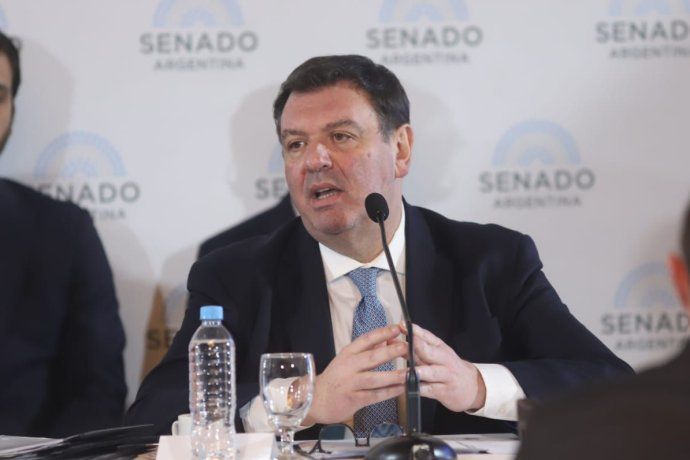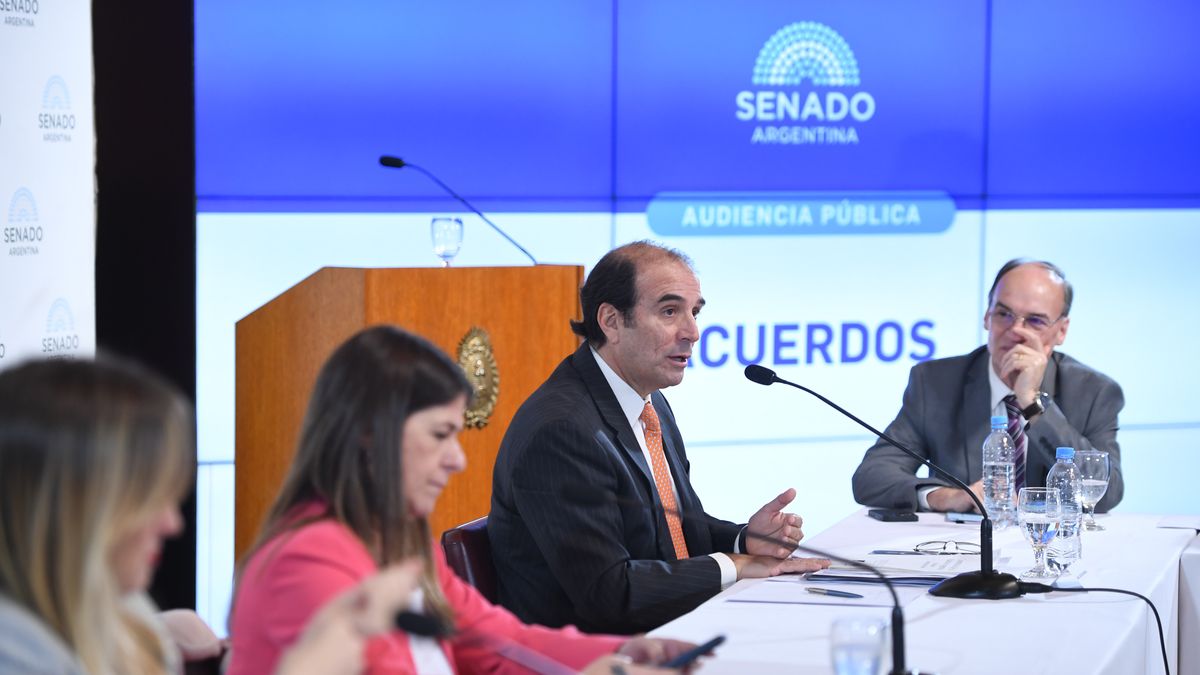After the presentation in the Senate of Ariel Lijothis Wednesday the constitutional lawyer Manuel Garcia Mansilla He defended his candidacy for seven hours Supreme Court of Justice. The candidate proposed by the ruling party said that the position was offered to him Santiago Caputo“I have never spoken to the President in my life, not even on the phone.”
The Court currently has four members after the departure of the judge Elena Highton de NolascoThe Government intends for that place to be occupied by Lijo, while García Mansilla could enter in December when the Juan Carlos Maqueda turns 75 years old. About Lijo there are Specific expressions of dissent from the UCR, PRO and even from the official Francisco Paoltroni, while Milei’s second candidate has been challenged for reactionary positions, such as his opposition to the Voluntary Termination of Pregnancy.
54-year-old constitutional lawyer, Manuel Garcia Mansilla He began his speech by highlighting his upbringing in three Argentine provinces (Río Negro, Misiones and Salta) and his first years of study in the city of Buenos Aires: “I started from the lowest point possible and I went through the entire career of a lawyer.”
In turn, he interpreted that “legislators can appeal to their moral convictions and the need to address social demands to modify laws” while judges “cannot do that under any circumstances.”Encouraging such behavior on the part of judges is an unacceptable way of freeing them from the limits that the Constitution itself also imposes on them. to them,” he added.
Senators Manuel Garcia Mansilla
García Mansilla with senators, prior to the hearing.
Senate
The lawyer admitted the current discredit of the Judiciary and attributed it to “the fact that Several judges on several occasions fail to apply the lawor at least that is the perception of the population.” “Sometimes the Judiciary promises more than it can deliver and sometimes interferes with systematic solutions,” he said. Protected by his technical and academic background, he omitted compromising answers about the anti-picketing protocol, condemnations of denialism or DNU 70/2023 by Javier Milei.
García Mansilla completed a master’s degree at the Georgetown University, USA and a PhD in Law from the Austral Universitywhere he currently serves as dean of the Faculty of Law. He is recognized for eight years of work in in the Marval, O’Farrell and Mairal studio, one of the most important in the country, and a decade of legal advice for companies in the oil and gas industry, which led him to become Executive Director of the Chamber of Exploration and Production of Hydrocarbons (CEPH).
In his most influential political interventions, he participated “in the bidding for provincial hydrocarbon areas“and “local and international companies on issues related to public law, energy law and commercial law.” In 2016, he spoke at a public hearing in favor of the rate increases made during Mauricio Macri’s administration. His Master’s thesis, entitled “The crisis of the separation of powers, the case of Argentina”, was critical of the use of Decrees of Necessity and Urgency (DNU).
Guadalupe Tagliaferri Senate

Guadalupe Tagliaferri, President of the Agreements Commission.
Ignacio Petunchi
Senate: Questions for Manuel García Mansilla
The senators’ questions to the candidate Manuel Garcia Mansilla They sought to clarify their opinion on current cases or on the positions of the other official candidate for the Court, Ariel Lijo. In both situations, the lawyer chose technical answers with jurisprudential citations, which avoided compromising his candidacy or that of Lijo himself. He also avoided the environmental consultations and the potential conflict of interest represented by his career in the energy and oil sector: ““It’s irrelevant what I think.”
One of García Mansilla’s most controversial positions has to do with his Opposition to the sanction of the Voluntary Interruption of Pregnancy. In this context, he understood that “it is essential that Congress specifically repeal the laws that contradict those that are being sanctioned. I also pointed out that there were thirteen cProvincial constitutions that expressly recognized the right to life from conception“I will look at each case with an open mind, analyze the arguments of each party and consider the human dimensions at stake,” he said, in the event that he receives a case related to abortion as a judge of the Court.
Another point of confrontation that was anticipated is the current lack of women in the composition of the Supreme Court. In this context, the lawyer acknowledged that “It is a very important issue but it does not prevent a male or female candidate from accepting a nomination.“; while he differentiated himself from the Lijo case: “My nomination does not replace a woman.” Then he sought to demystify another version: “It is very far from me to have an anti-Peronist bias,” he said.
Senate Manuel Garcia Mansilla

Manuel García Mansilla’s hearing in the Senate.
Senate
The lawyer was consulted about the constitutionality of dollarization: “Let’s assume that to dollarize, confiscate all dollar deposits what is in the banking system; Such dollarization would be flagrantly unconstitutional. for violation of the right to property.” However, if dollarization is done via an integration treaty within the framework of article 75 […] could be constitutional“This National Congress has given legal tender to foreign currencies on several occasions in the past,” he added.
In turn, he understood that “The Co-participation Law is a debt; 30 years have passed since the reform of ’94 and the agreement law, which has the soul of a contract and the body of a law, has not been passed.. One of the difficulties that this caused is an interpretation that states that unanimity of the provinces is needed”“As long as the political conditions for negotiating this law are met, there are reasonable arguments for reaching an agreement and for this Congress to approve a Co-participation law with a special majority,” he suggested.
Ariel Lijo defended his candidacy for the Supreme Court in the Senate and asked to reduce litigation
Last Wednesday, the Judge Ariel Lijo He defended his candidacy for eight hours to join the Supreme Court of Justice in the Commission of Agreements of the Senate“Today the Court is made up of academics and judges who come from different sectors of the legal activity; I will be a representative of the Judiciary there,” he said, adding: “The judiciary must acknowledge that it has learned from positive and negative experiences”.
Ariel Lijo audience.jpeg

Ariel Lijo during his presentation in the Senate, last Wednesday.
Ignacio Petunchi
At the beginning of his speech, Ariel Lijo thanked the President of the Nation for proposing him for the Supreme Court and stressed that “I dedicated my life to the Judiciary.” “This is the place where I must give explanations and formulate answers that you require about my skills and actions for the position for which I was nominated,” he said.
After presenting a development of his professional career, he stated that he will prioritize the “continuity of constitutional practice, which makes us grow as a republic.” and provides institutional and not personal solutions” and called for “streamlining the processes of producing sentences” and “finding mechanisms that simplify and lower the level of litigation that reaches the Court through various channels.”
“It seems to me that lThe Court must work essentially with Congress in the development of proposals for the problems that people have,” he analyzed and understood that it is necessary to expand through “agreements with churches of all faiths and other actors in civil society to establish delegations where there is a higher level of conflict.”
Report by Fernando Brovelli.-
Source: Ambito
I am a 24-year-old writer and journalist who has been working in the news industry for the past two years. I write primarily about market news, so if you’re looking for insights into what’s going on in the stock market or economic indicators, you’ve come to the right place. I also dabble in writing articles on lifestyle trends and pop culture news.




